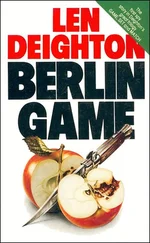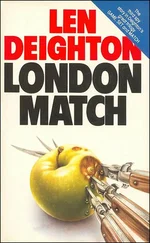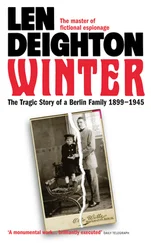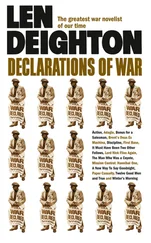‘I see, sir,’ said Douglas doubtfully.
‘The point I’m making, Superintendent, is that I will back you through thick and thin. Remember that. If you are happy working with this new fellow Huth – fine. But if any difficulties arise, come and see me and I’ll give him another officer.’
‘Thank you, General. I’ve no complaints.’
‘You’re not the sort who complains, Superintendent. I know that well enough. But my door is always open…Open to you, that is.’
‘Thank you, sir.’
Douglas reeled out of Kellerman’s office, lightheaded from the loss of sleep, sweet cigar smoke and the rich diet of flattery.
Harry Woods was snowed under by paperwork when Douglas returned to the office. The Gendarmerie had had no idea that the Peter Thomas murder might come into Wehrmacht jurisdiction until Harry Woods had arrived with a handful of Luftwaffe petrol coupons, and a written statement mentioning the Feldwebel and his black-market activities.
The military police and their civil counterparts were usually able to come to terms with this sort of crime, and in the usual course of events this matter would have probably been handled by the police unit best able to investigate the most serious part of the crime. In this case the Metropolitan CID would have been asked to investigate the murder.
But then came the top priority teleprinter message from Oberkommando der Wehrmacht, Berlin, instructing, with lots of Streng Geheim, Chef Sache and so on, that all files, documents and memoranda should be passed to SS-Standartenführer Huth at Scotland Yard.
Everyone informed of this new development knew that to deny that they had any files, documents or even memoranda would be interpreted at best as an indication of sloth and incompetence, at worst as a wilful refusal to obey this order from the most exalted levels of command.
In the circumstances it was unreasonable of Harry Woods to curse the men who were transferring to him virtually empty files, blank filing cards and meaningless dockets, every one of which was registered as very secret and so required faultless paperwork that the sender could produce, should the subject be raised again.
Douglas helped Harry Woods sort out some of the most difficult ones. Many of the forms, printed in German, were new to both men. Douglas had one of the porters bring them tea and sandwiches, and they worked through the lunch time. They always got on well together when they were working, and Harry Woods was, for a time, his old self. There was no sign of Huth. A message said he was in conference, but Harry said he was probably in bed and asleep.
It was two-thirty that afternoon when the phone call came from PC Jimmy Dunn. ‘I’ve seen the man, sir,’ Dunn told Douglas. ‘I didn’t speak with him of course but he met his friend the music-teacher for lunch today at the school. He’s due to be at the music class there this afternoon, the headmaster said. John Spode his name is.’
‘Good work, Jimmy,’ said Douglas.
‘He’s not a teacher, he just got himself a temporary job there on a day-to-day basis. I got his address from the school. I said I was from the Education Authority but I’m not sure they believed me. Then I went to look at his rooms. It’s a broken-down old place in Mafeking Street, Marylebone, not far from the school. No proper locks on the doors, and the caretaker was out, so I walked in and looked round.’
‘And?’
‘Two rooms, and share a bathroom. Not bad really, considering the way things are. It’s a bit grubby but there is a lovely little inlaid desk and some pictures on the wall that look as though they are worth a bit of money. I mean, art and antiques are not in my line, sir, but these things are old-looking but in very good condition. And I think that’s usually a sign things are worth something.’
‘But he’s clean?’
‘Well I haven’t turned him over, sir. But he’s clean I’d say: clean but not kosher.’
This had become the English policeman’s way of describing offences to which he would turn a blind eye.
‘Stay there, Jimmy,’ said Douglas. ‘I’ll come over and have a look round myself.’
The top storey of the house had been burned out by incendiary bombs, and Douglas could see through empty spaces that had once been windows, to charred rafters crisscrossing the sky. The ground floor windows were boarded up, the high price of glass made that a common sight in this neighbourhood. The suspect’s rooms were on the second floor. Jimmy Dunn led the way.
He’d rightly described the furniture as valuable. There was enough in this room to keep a man for a decade, a choicer selection by far than the items for sale in the Shepherd Market antique shop.
‘Still no sign of the caretaker?’ said Douglas.
‘There’s a bottle of milk outside his door. Looks like he’s been out all night – missed curfew and stayed overnight perhaps.’
‘Douglas nodded. Breaching German regulations –which required special permission for anyone, except the registered occupiers, to stay in a house overnight – was common enough.
‘Is there something funny about this place, Jimmy? Or am I just getting too old?’
‘In what way, sir?’
‘Valuable antiques in this room, and a cracked soap-holder in the bath; priceless carpet on the floor and dirty sheets on the bed.’
‘Perhaps he’s a miser, sir.’
‘Misers don’t buy soap at all,’ said Douglas. It was a silly answer but he knew this wasn’t the squalor of the niggard. ‘Smell the mothballs?’ Douglas got down on his hands and knees, and sniffed the carpet, but that had not been wrapped with mothballs. ‘It’s been in a storeroom,’ said Douglas, getting to his feet and brushing his hands to remove the dust. ‘That would be my guess.’ Douglas began going through the small chest of drawers, turning over a few shirts and underclothes, most of them British army issue. ‘There must be something more personal here,’ said Douglas as he rummaged, ‘…ration books, discharge papers, pension book or something.’
‘A lot of people carry all those sort of things with them,’ said Dunn. ‘There’s so much housebreaking. And it takes so long to get papers replaced.’
‘And yet he leaves all these valuables, without even a decent lock on the door?’ Douglas opened the next drawer, and went through it carefully. ‘Ah! Now what’s this?’ Under the newspaper that lined the drawer, his fingers found an envelope. Inside it he found half-a-dozen photos; Spode’s parents standing in a suburban garden somewhere, with two young children. A child on a tricycle. ‘A man finds it difficult to throw these kind of souvenirs away, Jimmy,’ he told the Constable. ‘Even when his life is at stake, it’s difficult to throw away your family.’ The next photo depicted a bride and groom. It was a snapshot, slightly out of focus.
Douglas looked through all the pictures. The largest one was an old press-photo; sharp, contrasty, and well printed on glossy paper. It was of a group of laboratory workers, in white coats, standing round an elderly man. He turned the photo over to read the caption. Rubber stamps gave the date reference number and warned that the photo was the copyright of a picture agency. The tattered typewritten caption-paper said, ‘Today Professor Frick celebrated his seventieth birthday. With him at his laboratory were the team who worked with him when, last year, his experiments brought him worldwide acclaim. By bombarding uranium with neutrons to form barium and krypton gas, he proved previous theories about the disintegration of the uranium nucleus.’
It was hardly the stuff of which newspaper headlines are made. The names of the scientists were also listed. They were meaningless except for the names ‘Dr John Spode and Dr William Spode’. Douglas turned the photo over to study the faces of the men squinting into the sun on that peaceful day so long ago. ‘Is that our man?’ he asked Dunn.
Читать дальше












